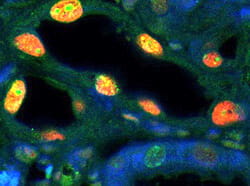Primary coenzyme Q10 nephropathy, a potentially treatable form of steroid-resistant nephrotic syndrome
Tan W, Airik R
Pediatric Nephrology
2021 Jan 22
Roscovitine Blocks Collecting Duct Cyst Growth in Cep164-deficient Kidneys
Airik R, Airik M, Schueler M, Bates CM, Hildebrandt F
Kidney International
2019 Aug
Delayed Onset of Smooth Muscle Cell Differentiation Leads to Hydroureter Formation in Mice with Conditional Loss of the Zinc Finger Transcription Factor Gene Gata2 in the Ureteric Mesenchyme
Weiss AC, Bohnenpoll T, Kurz J, Blank P, Airik R, Lüdtke TH, Kleppa MJ, Deuper L, Kaiser M, Mamo TM, Costa R, von Hahn T, Trowe MO, Kispert A
The Journal of Pathology
2019 Mar 27
Treatment with 2,4-Dihydroxybenzoic Acid Prevents FSGS Progression and Renal Fibrosis in Podocyte-Specific Coq6 Knockout Mice
Widmeier E, Airik M, Hugo H, Schapiro D, Wedel J, Ghosh CC, Nakayama M, Schneider R, Awad AM, Nag A, Cho J, Schueler M, Clarke CF, Airik R, Hildebrandt F
Journal of the American Society of Nephrology
2019 Feb 8
Osteoclast Stimulation Factor 1 (Ostf1) KNOCKOUT Increases Trabecular Bone Mass in Mice
Vermeren M, Lyraki R, Wani S, Airik R, Albagha O, Mort R, Hildebrandt F, Hurd T
Mammalian Genome
2017 Dec
SDCCAG8 Interacts with RAB Effector Proteins RABEP2 and ERC1 and Is Required for Hedgehog Signaling
Airik R, Schueler M, Airik M, Cho J, Ulanowicz KA, Porath JD, Hurd TW, Bekker-Jensen S, Schrøder JM, Andersen JS, Hildebrandt F
PLoS One
2016 May 25










